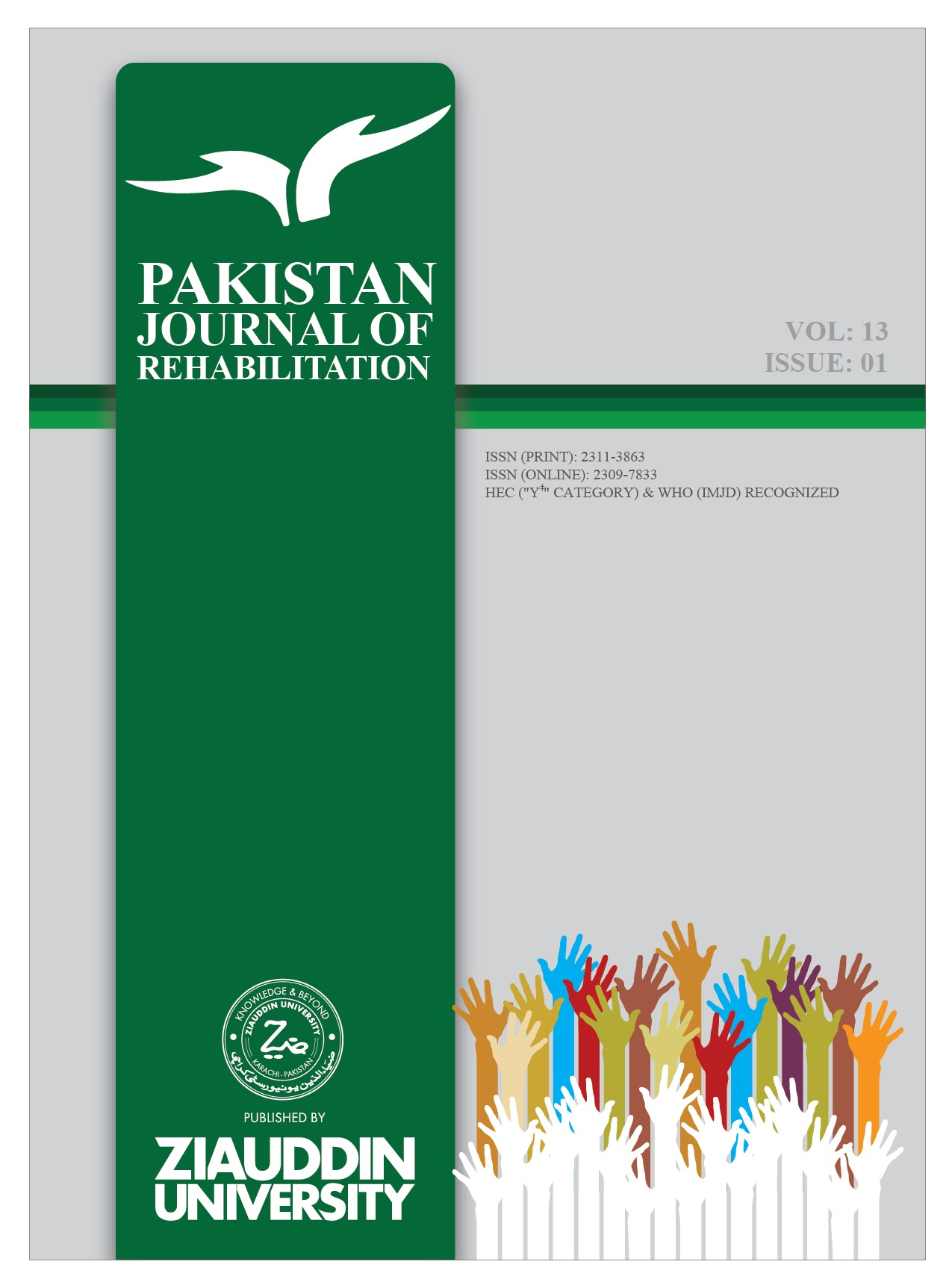12
2
2023
1707976069400_3473
1-2
http://ojs.zu.edu.pk/ojs/index.php/pjr/article/download/2316/699
Received: Tues, Jun 13, 2023 Accepted: Mon, June 26, 2023 Published: Thurs, July 06, 2023
DOI: 10.36283/pjr.zu.12.2/001
EDITORIAL Pakistan Journal of Rehabilitation
Volume 12(Issue 2), 2023 | Page No.
ENHANCING REHABILITATION THROUGH REGULATION AND INTERDISCIPLINARY COLLABORATION IN PAKISTAN
Yara Peterkoi
Rehabilitation forms an important tire in well operating health care systems. Within the areas as mentioned on the World Health Organization factsheet about rehabilitation the therapeutic professions such as physiotherapists, occupational therapists, speech and language therapists, prosthetists and orthotists and clinical psychologists play an important role. They do not only treat people’s conditions such as diseases, disorders, injuries or trauma; they furthermore promote good health and help to prevent diseases. This can significantly lead to better overall wellbeing of the population. To gain the best client outcome and support the health care system in an effective way, regulation is as important as interprofessional collaboration. Thus there is an intense need to highlight these two main aspects to ensure quality rehabilitation provided by therapeutic professionals.
Different studies have emphasized the evidence regarding regulation is not high due to various reasons. But it is noticeable that by regulating a profession, the needs of three different stakeholders can be addressed simultaneously. Clients can be confident to receive high quality service provided by an individual who has undergone certified training and is adhering to recent guidelines and standards. Their interest is protected and public trust in the professions is strengthened. Governmental bodies additionally have better understanding about the resources of the professions that can be integrated in the health care system of the country. And of course for the profession itself it is a great opportunity for professional growth and development. Through the process of developing or being involved in the development of a regulatory framework, professionals associations are engaging in fundamental aspects that form the profession. This way the associations are making sure to pave the way for a sustainable workforce.
As rehabilitation in most cases happens in a multidisciplinary team, regulation of involved professions can be also looked at from a multidisciplinary angle where applicable. Combining hands- on therapeutic professions in one regulatory framework can be beneficial if their unique contributions and challenges in the rehabilitation process are described. It can especially support the alignment of the education and foster later interdisciplinary work. These professions share the main aspects of the therapeutic process like evaluation, goal setting, client centered intervention and re-evaluation, but are following different goals and techniques to enhance client outcome. The associations can support each other and regulatory bodies with the development of a clear structured, comprehensive framework including aspects like ethical standards, continuous professional development framework and further documents.
The Ziauddin University is on the list of I4OA, I4OC, and JISC.
This is an open-access article distributed under the terms of the Creative Commons Attribution License (CC BY 4.0).
Conflict of Interest: The author (s) have no conflict of interest regarding any of the activity perform by PJR.
To be secure in their profession, a well-defined scope of practice and an education that is aligned with it, is crucial for any of the professions mentioned above. A robust regulatory framework not only ensures the client's safety, but also leads to qualified professionals who are confident in their field and can use their strengths to collaborate with others. Interprofessional collaboration is an important factor when it comes to positive client outcomes.
To summarize, client outcomes are supported by regulation in two ways. The first one is very fundamental as through regulation of the profession it is ensured that only highly qualified professionals are entitled to offer services to the public which leads to better client outcomes. Secondly, regulation of a profession leads to better interprofessional collaboration, which is also linked to better client outcomes. Interprofessional collaboration can be elevated through regulation as professionals become more confident in their role; this enables them to educate others about their competencies and scope of practice and to determine when to seek support and collaboration.
i Occupational Therapist, Board Member, Ergotherapy, Austria, Europe (0009-0009-3526-304X)
ISSN PRINT: 2311-3863 1 ISSN ONLINE: 2309-7833
| Article Title | Authors | Vol Info | Year |
Volume 12 Issue 2 | 2023 | ||
Volume 12 Issue 2 | 2023 | ||
Volume 12 Issue 2 | 2023 | ||
Volume 12 Issue 2 | 2023 | ||
Volume 12 Issue 2 | 2023 | ||
Volume 12 Issue 2 | 2023 | ||
Volume 12 Issue 2 | 2023 | ||
Volume 12 Issue 2 | 2023 | ||
Volume 12 Issue 2 | 2023 | ||
Volume 12 Issue 2 | 2023 | ||
Volume 12 Issue 2 | 2023 | ||
Volume 12 Issue 2 | 2023 | ||
Volume 12 Issue 2 | 2023 | ||
Volume 12 Issue 2 | 2023 | ||
Volume 12 Issue 2 | 2023 | ||
Volume 12 Issue 2 | 2023 | ||
Volume 12 Issue 2 | 2023 | ||
| Article Title | Authors | Vol Info | Year |
